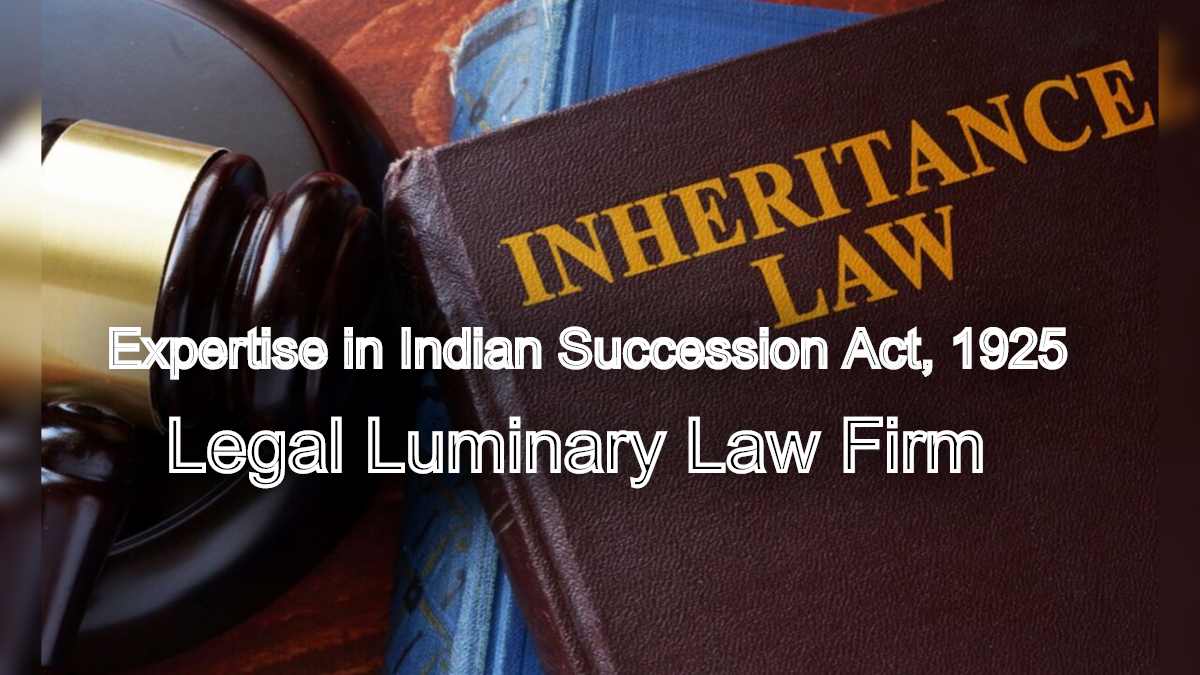Inheritance Simplified: Expertise in Indian Succession Act, 1925
Expertise in Indian Succession: Inheritance, the process of transferring property or assets upon the death of a person, is a complex legal matter governed by specific laws and regulations. In India, the Indian Succession Act, 1925, is the primary legislation governing inheritance. Understanding the intricacies of this act and navigating the legal processes involved can be daunting. This is where the expertise of a specialized law firm like Legal Luminary becomes invaluable.
Expertise in Indian Succession Act, 1925: Legal Luminary Law Firm
Understanding the Indian Succession Act, 1925
The Indian Succession Act, 1925, provides a comprehensive framework for the succession of property in India. It outlines the rules governing inheritance based on different personal laws, such as Hindu law, Muslim law, Christian law, and Parsi law. The act covers various aspects of inheritance, including:
- Intestate Succession: This refers to the succession of property when a person dies without a will. The act specifies the legal heirs and their share in the property based on their relationship to the deceased.
- Testate Succession: This refers to the succession of property when a person dies with a will. The will specifies the desired distribution of property among the beneficiaries.
- Wills and Codicils: The act provides guidelines for the execution, revocation, and interpretation of wills and codicils.
- Succession Certificate: A succession certificate is a legal document that proves the legal heir’s right to inherit property.
- Partition: The act deals with the division of joint family property among the members of the family.
The Role of Legal Luminary Law Firm
Legal Luminary Law Firm is a specialized law firm with expertise in the Indian Succession Act, 1925. Their team of experienced legal professionals provides comprehensive legal services related to inheritance, ensuring that the process is smooth and hassle-free. Some of their key services include:
- Will Drafting: The firm assists clients in drafting legally sound and comprehensive wills that reflect their wishes and intentions.
- Succession Certificate Assistance: Legal Luminary assists clients in obtaining succession certificates, a crucial document for inheriting property.
- Partition Proceedings: The firm represents clients in partition proceedings, ensuring a fair and equitable division of joint family property.
- Dispute Resolution: In case of inheritance disputes, the firm provides effective legal representation and advocates for the client’s rights.
- Estate Planning: Legal Luminary assists clients in developing comprehensive estate plans to ensure the smooth transfer of assets to future generations.
Benefits of Working with Legal Luminary
Partnering with Legal Luminary Law Firm offers several benefits for individuals dealing with inheritance matters:
- Expertise in Indian Succession Act: The firm’s lawyers possess in-depth knowledge of the Indian Succession Act, ensuring that their clients receive expert legal advice.
- Tailored Solutions: Legal Luminary provides customized solutions based on the specific needs and circumstances of each client.
- Efficient Process: The firm’s efficient approach and attention to detail ensure a smooth and timely resolution of inheritance matters.
- Peace of Mind: By entrusting inheritance matters to Legal Luminary, clients can have peace of mind knowing that their legal rights are protected.
FAQs
Intestate succession occurs when a person dies without a will, while testate succession occurs when a person dies with a will.
The legal heirs under Indian Succession Act vary depending on the personal law applicable to the deceased. Generally, the heirs include spouse, children, parents, siblings, and other relatives.
The documents required to obtain a succession certificate vary depending on the state and the nature of the property. However, generally, they include a death certificate, proof of relationship, and other relevant documents.
Yes, a will can be challenged under certain circumstances, such as if it is found to be invalid, fraudulent, or obtained through undue influence.
An executor is a person appointed by the testator (the person who made the will) to carry out the provisions of the will. They are responsible for collecting the assets, paying debts, and distributing the property according to the testator’s wishes.
Conclusion
Inheritance can be a complex legal matter, and understanding the intricacies of the Indian Succession Act is crucial. Individuals can ensure efficient and effective handling of their inheritance matters by partnering with Legal Luminary Law Firm. The firm’s expertise, experience, and commitment to client satisfaction make them a trusted partner in navigating the complexities of inheritance.
Read More
- Family Matters Resolved: Navigating Hindu Succession Act, 1956
- Property Transactions Simplified: Exploring the Transfer of Property Act, 1882
- Marriage Matters Simplified: Navigating the Special Marriage Act, 1954
- Matrimonial Matters Simplified: Insights into Hindu Marriage Act, 1955
- Unraveling Legal Evidence: Understanding the Indian Evidence Act, 1872
- Ministry of Law and Justice:

